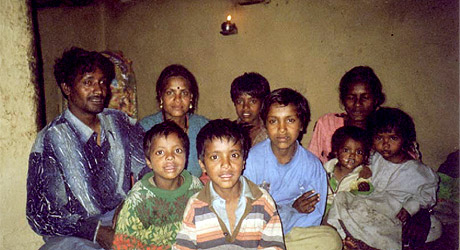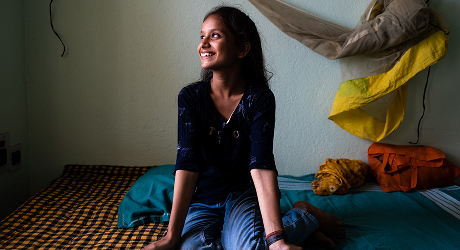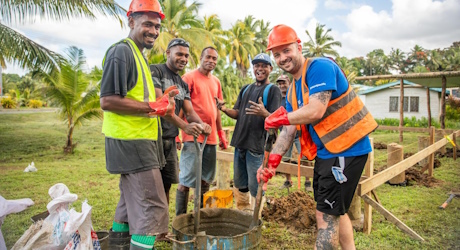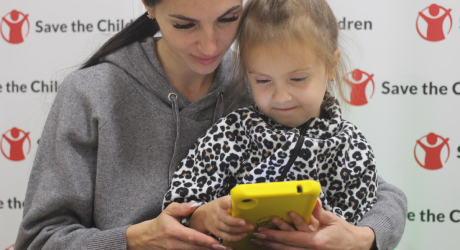Footprints Project
Since 2005, travelers like you have helped us change the world through micro-donations.

-
A total of
3050
Travelers
-
donated
$7800.71
(100% funded) -
to help improve
Energy
-
impacting
326
people -
in
India
Despite the extended transport period the ‘fragile’ goods languished at various railway plat-forms en-route, bounced around in trucks and was finally delivered via a mule train into the mountains… the damage was minimal! With remaining available funds we were able to also include a couple of extra households. We discovered some elderly women whom lived separately from family, the local saffron Baba and two temples used for festivals, Pooja, Mela etc were new recipients of light.
COMMUNITY ANTICIPATION
The community excitement was palpable as the bulk load (65 units) were stored at the PEAK building ready for installation. However, delays in delivery and adverse weather conditions meant in the time lapse between storage and installation we spent many hours fielding solar questions. The enthusiasm grew to such proportions that even carrying the panels/tool-bag/cable for installation was out of the question as many eager hands came forth to help!
SOLAR EDUCATION
The beauty of the solar units lay in there simplicity, so it was decided to have adult family members (female & male) help with installation so that the basic technical aspects were understood by all participants. Educating the community with solar technology knowledge is beneficial for the future to trouble shoot any minor problems that may arise, especially if PEAK staff are unavailable for repairs/maintenance.

Solar delivery, storage and testing
CASTE REALITIES
The installation began geographically at the lower end of town which is inhabited by Dalits (lower caste). As a mark of respect the first system was installed in the newly appointed Pradan’s house, Dhanni Ram is the first Dalit Pradan in Khati’s history – a definite mile-stone. Throughout town the installation process was relatively smooth… that is if you include the odd crossed wired, small hands constantly fiddling with tools and the bee swarm that besieged Scott and his small TA’s high up on a slate tile roof one sunny afternoon!
LIGHT, GENDER & MICRO ENTERPRISE
Women and children spend the most time indoors cooking, performing household tasks and studying and the sense of joy conveyed to us at having light to cook and read by is fantastic. The hospitality extended to us has been overwhelming with veritable ‘feasts’ be-ing the order of the day, all prepared and cooked under solar light which has saved families from both the toxicity and expense of kerosene. The use of the solar units soon expanded to outside the home with lights being used for a recent wedding and for a variety of Poojas.
There are some households who when their daily labour is completed they work under poor quality lamplight making clothes and in one case brewing ‘home brew’ to supplement daily income. These households have been thrilled to come home and have the ability to switch on a light and commence work - often until late at night - without battling inherent eye strain. People claim their productivity has been enhanced and due to changed house-hold conditions, a light source has paved the way for future cottage industry. It has been incredible what a difference something as basic as efficient lighting can make to the daily functioning of a household.

Khati Sarpanch and family reading by light
RE-USE OF PACKAGING
PEAK was confronted with the vexing issue of packaging disposal. After much discussion, the decision was to deal with waste on site. This included burning the cardboard boxes and all inserts, with the rest of the packaging re-used. The hard plywood was used for shelving in houses across Khati, soft ply was turned into classroom resources (ABC cards, games etc) while the remaining cardboard and light boxes provided much needed material for craft classes. Material re-use saved the complexities of packing out waste materials where their disposal may not be sound in an otherwise sensitive Himalayan environment (i.e. being tossed off a cliff in Almora!)
LET THERE BE LIGHT
Despite the inherent complexities and problems surrounding the initial stages of the project, it has been an exceptionally rewarding experience to provide light to an entire community. To walk through Khati under starlight and see the ‘window glow’ of ‘captured’ solar light has had a positive community impact and changed the daily lives of many.
WHAT NEXT?
PEAK staff will monitor the Solar home lighting units performance in the Himalayan weather conditions and be available for any technical problems should they arise. They will also continue to impart information on solar technology. It is envisioned in 2009 to under-take a small maintenance program to ensure the systems continue to run smoothly. PEAK aims to expand the solar project to equip Jatoli village in the Sunderdhunga Valley with solar home lighting units in the near future.
Report by Bonnie Flynn, PEAK
Posted 18 DEC 2008
INTERIM PROJECT REPORT
Update posted 14 July 2008
This report provides an overview of the progress and challenges of The Solar Home Lighting system project from conception through to delivery of the lighting units to the village of Khati. The final phase – installation of the units - is scheduled for completion in October 2008.
Planning Stages
Initially, it was calculated that 58 solar units would provide a Solar Home Lighting Unit for all Khati households. However a second audit conducted by PEAK staff members going from house to house discovered that grandparents, solo women, and one couple whose marriage had not been religiously ‘sanctioned’ actually lived independently from their families and had been omitted by community members from the original figures. The final tally meant the provision of light was needed for 65 households.
Luckily, the growth of the Australian dollar exchange rate between project funding stage and purchase, has allowed for these extra units.
Purchasing the Lighting Units
Since the project inception, technology changes have allowed an upgrade from the original 33 LED bulb to a superior 42 LED bulb and a separate 6 LED night-lamp. The units were ordered through the Grameen Surya Bijlee Foundation.
Delivery to the remote Pindari Valley
The approximate delivery time for the units was initially set for 10-15 days. With the PEAK team firmly ensconced in the Himalayas the time came and went … and then began the waiting phase with many anxious moments ‘ears strained’ listening for mule bells entering into Khati precincts that would herald the arrival of the goods.
Communication with the outside world necessitates an 16km round trip to Dhakuri Pass where a recently installed PCO (phone) has become a lifeline between mountain families and their loved ones who are employed in distant climes and strung out project coordinators!
Occasional day trips to the phone brought to light a seemingly unending series of bureaucratic delays that started by having the wrong Sales Tax paperwork, crossing state borders with this wrong paperwork, to finally getting the right paperwork after 3 months waiting… only to leave it behind at the Kathgodam railway station at the base of the sub-Himalaya… and finally after further to-ing and fro-ing, with the units and their precious paperwork loaded onto a truck the goods made their last slow journey into the Pindari Valley.
It has been a lesson in patience and the archaic slow wheels of Indian bureaucracy.
What Next?
Due to the delivery delays and monsoonal weather the installation of the units won’t occur until approx Sept/Oct 2008 when the PEAK team return to Khati. Stay tuned for a final report and photos in later October or November.
Bonnie Flynn, PEAK
Update posted 14 July 2008
Traveling soon? When you buy travel insurance with us, you can make a contribution towards a cause you care about.
Get a quote






